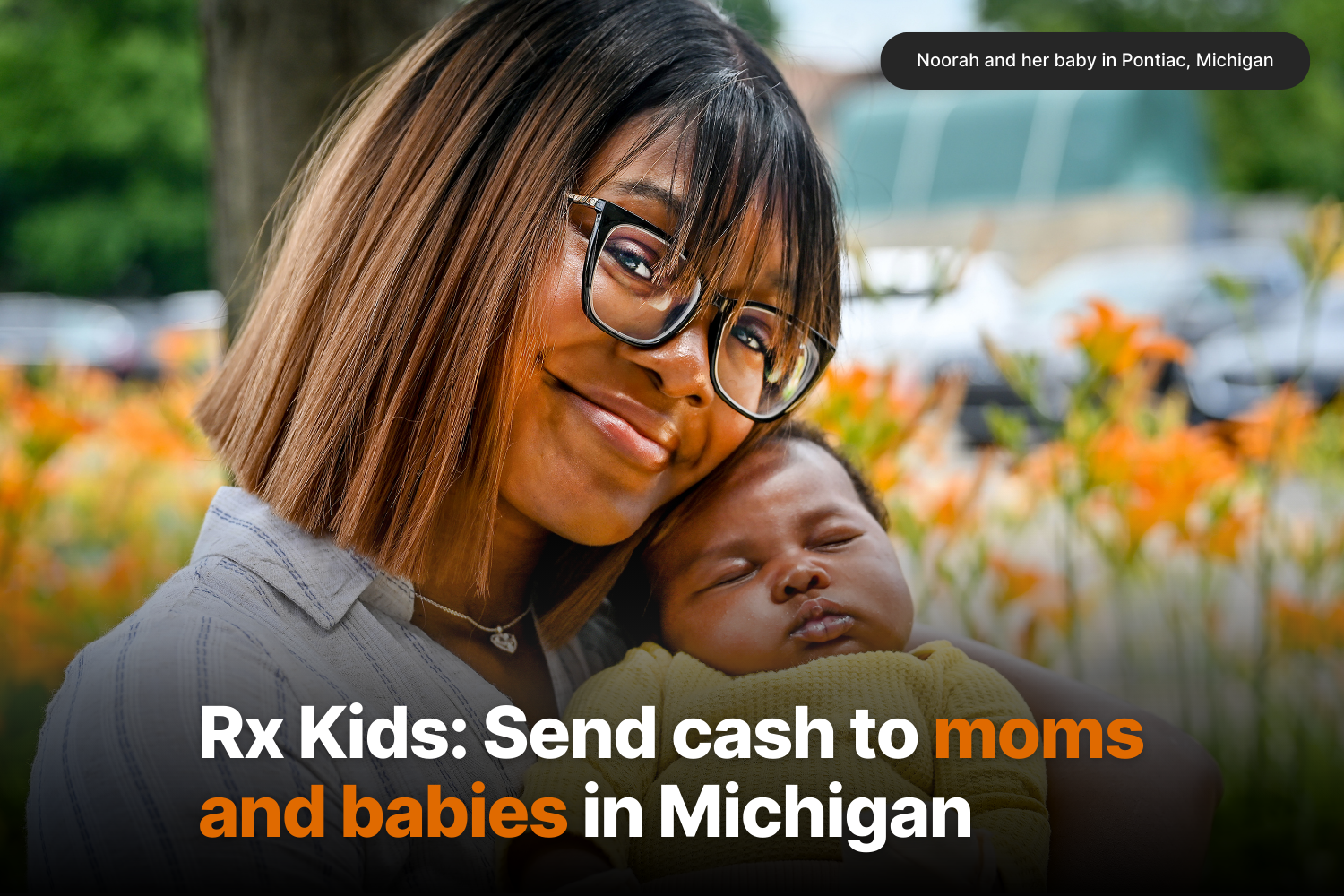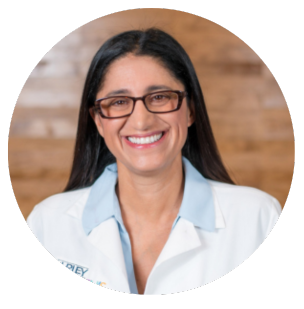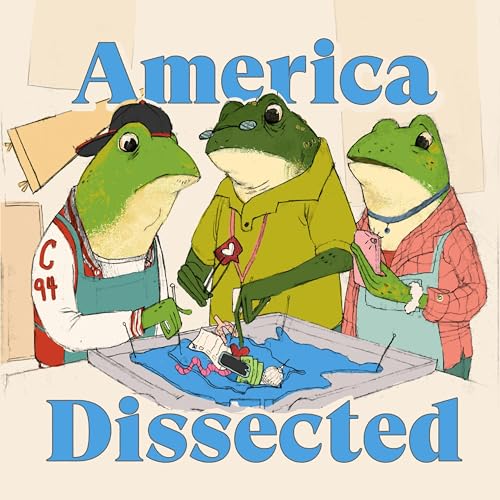Rx Kids: Send cash to moms and babies in Michigan
In Partnership with
Michigan State University Pediatric Public Health Initiative and Poverty Solutions at University of Michigan

Nearly 4 in 10 children in Michigan are growing up in households struggling to pay for housing and basic necessities, with 17% living below the poverty line.
We can break this cycle and invest in the next generation by giving families what they truly need: cash. Together, our impact can help transform the way we support families in poverty across the country.
We are expanding Rx Kids to additional communities in Michigan
Inspired by the resounding success of Rx Kids in Flint and with the support of local and national champions, we have expanded the program to nearly a dozen Michigan communities, delivering more than $14m in unrestricted cash to families across the state. Our vision for a healthier, more supportive start for children is gaining momentum, with at least six new sites planned in the coming months.
The program’s expansion will continue its goal of improving outcomes, reducing racial and geographic inequities, and boosting local economies.
You can help us reach every new mom and baby in Michigan communities for the next 5 years
Every year, around 7,000 children are born in Michigan into families facing food insecurity and unequal access to healthcare. These first months of life are critical for a baby’s development; it’s also when their families are struggling the most.
Together, we can deliver up to $7,500 to the mother of every single infant born in participating communities – with no strings attached.
- Every mom will receive $1,500 during their pregnancy to spend on food, prenatal care, rent, or whatever they need most.
- After giving birth, moms will receive $500/month for up to 12 months to cover formula, diapers, childcare, and everything else.
Rx Kids is tackling the leading social determinant of health: poverty. Join hundreds of other donors helping catalyze community-wide change in Michigan and beyond.
Apply here if you’re interested in enrolling to receive funds →
Cash is proven to work – especially in the hands of new moms
Hundreds of studies show that unconditional cash transfers can be life-changing across countries and contexts. Mothers and babies are no different, and early intervention is shown to have sustained health and development impacts years after cash is delivered.
- Healthier pregnancies: Multiple studies have found positive impacts of cash on birth weight, premature births, and breastfeeding, parental mental health, and food security.
- Impact lasts into adulthood: Years after their moms received cash transfers, adult children experienced benefits across health, education, and nutrition, lifetime earnings, and reduced anxiety and depression.
- Communities benefit too: In addition to participating families, cash programs are a boon for local economies. In its first year of operation in Flint, every dollar prescribed through Rx Kids injected an estimated $1.6 into the city’s economy.
A population-level study of Rx Kids in Flint found that the program cut preterm births by up to 18% and low birthweight births by up to 27%. The program prevented ~36 preterm births and ~60 NICU admissions, saving an estimated $6.2 million in healthcare costs.
Another Rx Kids study that surveyed 1,000+ moms found the program nearly eliminated evictions, reduced housing debt, and gave families the security to buy the food they wanted.
We plan to continue measuring impacts at the individual and community level, including on maternal and infant health, local employment and investment, and more.
Let’s reimagine how society supports families and children
We know cash works for families in need – the Expanded Child Tax Credit helped keep 3.7m children out of poverty. Yet Congress failed to renew the credit and other direct cash assistance programs only reach 21% of eligible families in need.
The Rx Kids expansion boldly reimagines how we care for each other by walking alongside families during the challenging time of pregnancy and infancy.
Michigan is just the beginning. If we can demonstrate the power of cash allowances to address profound economic and health inequities in the state’s highest poverty communities, we can spark a national movement to shift more resources directly to families and ensure every baby has the opportunity to thrive.
In the News
Partners



Frequently Asked Questions
Which communities are participating in the program?
These are the communities that are enrolling now or will soon be enrolling eligible families:
- City of Flint
- City of Kalamanzoo
- Eastern Upper Peninsula (Chippewa County, Luce County, Mackinac County, Alger County, and Schoolcraft County)
- Oakland County Communities (Pontiac, Royal Oak Township, Hazel Park)
- Wayne County Communities (Highland Park, Hamtramck, Inkster, Melvindale, River Rouge, City of Dearborn)
We will update the list as communities lock in their enrollment dates.
Who is eligible to receive funds?
All expectant mothers in participating communities who are 16+ weeks pregnant are eligible to enroll, as well as all infants up to 6 months old.
If you’re interested in enrolling to receive funds, apply here.
How much money do mothers receive?
Up to $7,500, depending on the participating community. This includes one-time, $1,500 transfers upon enrollment during pregnancy, followed by up to 12 monthly payments of $500 during their infant’s first year of life.
Communities can implement Rx Kids as a perinatal program (up to 6 months of cash payments) or the full postnatal program (up to 12 months of cash payments).
Can dads or non-birthing parents receive payments?
Only birthing parents can receive the prenatal payment, as it’s intended to support development in utero. Infant payments are intended to follow the child, so if a birthing parent is not the baby’s primary caregiver, the primary caregiver, including fathers, adoptive and foster parents, and other non-birthing parents, can sign up for the program.
When will people receive the money?
Participating families are eligible for payments from their community’s launch date.
Enrollment is on a rolling basis, and new babies have joined the Rx Kids family every day since January 2024.
How long will the program run?
We’re aiming to deliver cash to families for 5+ years in Flint and 2+ years in additional communities in Michigan.
By becoming an Rx Kids donor, you’re helping bridge this gap to ensure we can reach ~47,000 new moms and babies through 2027. Bringing Rx Kids to multiple new locations requires $104m in total funding to cover cash transfers, program expenses, and impact evaluation.
How will you study the program’s impact?
Rx Kids has an exceptionally high take up rate (an average of 98% across our communities), which allows us to conduct extensive community-level analysis using government and health system data.
Researchers at Michigan State University-Hurley Children’s Hospital Pediatric Public Health Initiative and Poverty Solutions at the University of Michigan are conducting mixed methods evaluations that include quantitative and qualitative analysis of administrative records and recipient surveys, alongside interviews with participating mothers.
This research examines whether the program improves birth outcomes, maternal health, early childhood health, financial stability, health care utilization, and community economic and civic well-being.
We aim to isolate the impacts of the transfers from other factors by including comparison groups of babies born outside of the participating communities and in previous years.
What do you do with excess funds raised?
If for any reason we are unable to deliver all funds raised to expectant mothers enrolled in Rx Kids, donations will be delivered to other low-income Americans in need.
Similarly, if a donor makes a recurring donation, any future payments made after the campaign closes will be allocated to other U.S. cash programs.
Are donations tax-deductible?
Yes, donations are tax-deductible in the United States. GiveDirectly is a registered 501(c)(3), and our U.S. federal EIN is 27-1661997.
We accept all major credit and debit cards, PayPal, checks, wires, stocks, cryptocurrencies, and more. Reach out to us at info@givedirectly.org for more information on ways to give.






